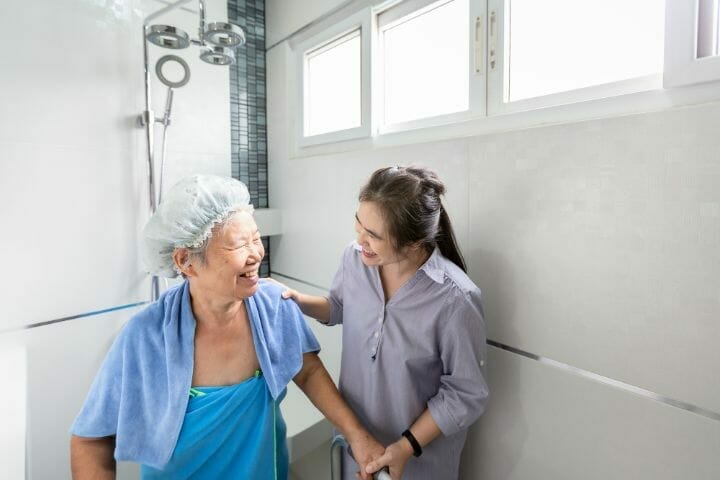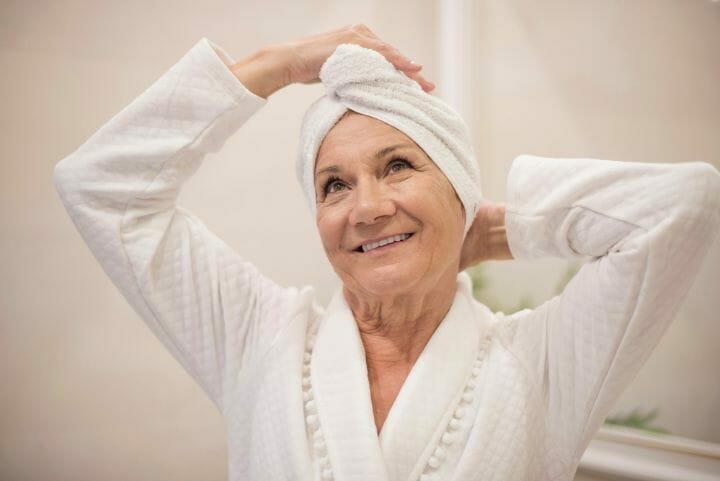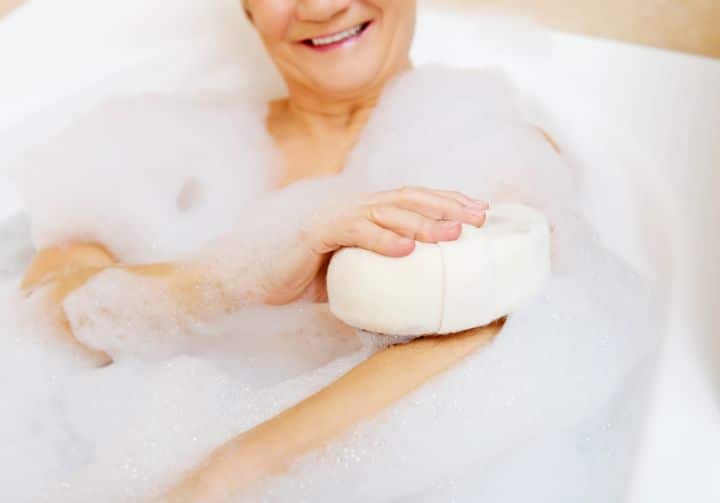As the elderly age, they tend to have less and less energy to get everything done in their daily routine. This especially includes the more routine tasks for which their enthusiasm tends to dwindle with time.
However, as you age, you need not perform all activities with the same frequency as compared to when you were younger. Bathing is one of those activities.
This article talks about issues faced if the elderly refuse to shower often and how to address them.
Contents
So how often should an elderly person take a bath?
It is a good idea for an elderly person to take a bath at least once or twice a week. This can prevent instances of skin breaks and infections. This does not imply that the bath has to be a full bath or shower session.
In fact, you can give the elderly a sponge bath as long as you ensure that all areas are cleaned well with soap and water.
On those days when they are not taking a bath, you may try to get them to wipe their faces, under their arms, their feet, and their private parts with wet towels. If the weather is humid, hot, and sweaty, you may want to give them a little more bath.
The skin of the elderly is thinner and way more sensitive as compared to younger people. You should thus be careful that you so not over wash it. With age, the tendency of the skin to produce oils decreases making it prone to bruising and tearing.
You would have noticed how many elderly people tend to have bruises on their arms. This is why you should apply a good moisturizer to get some oils back into the skin after bathing, as this helps in keeping the skin supple while preventing skin tears or breaks.
You may also like Questions to Ask When Hiring a Caregiver for Elderly Parents
Are there any exceptions to the once or twice a week minimum limit for giving baths to the elderly?
If the elderly in your house suffer from ailments like dementia, they may need additional bathing or showering, considering they no longer know how to use a toilet. This can assist in avoiding infections and the frequency for this will depend on how often they have been soiling or wetting themselves.
If the elderly are doubly incontinent or incontinent , you would not want to leave the person without wiping and washing them. You will also make a change of clothing or padding to them.
If the elderly are left sitting in a used incontinence pad, it can quicky lead to the bacteria breaking the skin and further to much more serious infections.
Does the body odor change with age?
Once we reach the age of 40, our skin tends to produce lesser antioxidants which may lead to a change in the body odor. On the skin we have lipid acid, when it gets oxidized, it will form 2-nonenal which is a chemical compound. This compound tends to have a or grassy or greasy smell and lingers for some time in the clothes, thereby bringing the odor to clothes and bed linen.
If you smell a similar sort of odor from your loved one, remember that it isn’t because they ain’t bathing enough. It can be because of the presence of this compound.
You may also like How The Elderly Can Improve Mobility
When should an elderly person plan to wash their hair?
On an average, washing hair one time a week is enough for an elderly person. The less a person washes their hair, the lesser would be the oils produced and lesser dirt will stick to the hair. This would reduce the need to wash the hair.
You would also not want to overdo the washing of the hair as they get thinner with time and too much of washing can significantly damage them.
What are some of the common reasons because of which the elderly do not want to bathe?
Cost: Sometimes the elderly have a limited budget that does not extend to paying additional money for frequent showers or baths and procuring grooming supplies.
Boredom and Isolation: If the elderly ain’t doing much during the day, sometimes for them one day drifts into another. They simply do not realize that it has been quite some time since they had taken a bath.If the elderly are isolated and not very social, or they do not get out much, they do not see a point in keeping up with any appearances.
Paucity of time: With age, the elderly tend to slow down a great deal. However, the amount of daily chores remains more or less the same. In such a situation, they are bound to pick and choose their priorities. If bathing doesn’t come in that list, it is mostly missed as a routine activity.
Physical issues: The elderly tend to catch a cold more easily than younger people. This turns out to be a problem for them while taking a bath.
In addition to this, sometimes the lack of dexterity of hands or just not having enough energy to do their daily tasks makes the elderly skip bathing altogether during the day. Some elderly experienced conditions like arthritis, or knee and hip problems, that can make the process of stepping in and out of the shower or bathtub difficult.
In addition to this, loss, or partial loss of sight or hearing can lead to the elderly moving slower than usual to avoid getting hurt. This can lead to all the personal care routine tasks taking a much longer time than usual.
Also, sometimes due to the elderly sometimes losing the sense of smell, they may not be even aware of needing a wash.
Mental issues: Sometimes depression can be one of the factors because of which the elderly can lose interest in personal grooming-related tasks including taking a bath. It can also come out to be an issue with the elderly who suffer from dementia and can suffer from short-term memory loss. In such cases, they do not even remember how to take a bath.
Fear of mishaps: It has been estimated that more than 80% of fall-related accidents for the elderly occur inside of a bathroom. This brings in an inherent fear in the elderly of a possible mishap making them stay away from the bathroom as much as possible.
Loss of Dignity: Sometimes the elderly are uncomfortable asking for help as they feel it to be demeaning to do so.
You may also like How to Get Guardianship of an Elderly Parent?
How do you convince the elderly if they refuse to take a bath or wear fresh clothing?
Once you have identified the reason because of which your loved one is resisting baths, there are different approaches that you may try. It might be a case of trial and error before you identify the right approach that works for you.
Use the Doctor as a key resource
In some cases, the doctor can turn out to be a powerful ally. A doctor can help in determining if the elderly are suffering from symptoms of depression and can prescribe anti-depressants to lift their spirits and give them more energy. If the senior experiences a renewed interest in life, it can also make them more aware of the requirement to shower or take a bath and wear tidy clothes.
The elderly often place their doctors on a higher pedestal and may take their official advice more seriously than the pleading and nagging fo a family member.
Overcoming the power struggle related to poor hygiene
If you find yourself in a situation where the elder does not want to be bossed around, a little trickery might work sometimes. If you can get a close friend to call and extend an invitation out for lunch or some other gathering, it would give them a reason to get cleaned up for someone besides family. This might seem childish but a promise of meeting someone outside the family can be a powerful motivator for a bit of primping.
You may also like How to Care for a Bedridden Elderly Person?
Use the right bath aids and products that maximize comfort
The market has a lot of specially designed bath aids and products that you can consider to add on to their comfort.
For instance, if the elderly are not steady on their feet in the shower or get tired easily, there are many types of shower chairs that are available. This can significantly reduce the risk of falling.
You can also get grab bars that can be used. In addition to this, if the elderly are afraid or overwhelmed by water, a hand-held showerhead can be quite useful. It allows them to direct the stream of water only wherever they want it.
In addition to these, personal hygiene products like Persimmon soap to combat nominal and other troublesome body odors, no-rinse body baths, etc. can also help you in managing the personal hygiene of the elderly.
Framing the conversation around personal hygiene positively
The manner in which you bring up the topic of bathing and changing clothing can impact the direction the conversation might take. If the elderly require your assistance in the shower and enjoy getting pampered, you may try referring to bath days as spa days.
Using products like scented body wash and their favorite scented lotions can help them focus on the enjoyable aspects that make them feel good afterward as compared to the overall process.
Be considerate and gentle when you need to point out body odor or their soiled clothing. In some situations, the seniors may get embarrassed when these issues are brought to their attention. If they are indifferent, remember that too much nagging can turn out to be counterproductive.
Most elders love getting attention. In such cases, bringing in positive reinforcement through compliments on how polished they look can be helpful.
Tread carefully and softly if the elderly have dementia
Dementia care is quite unique to each family. Some patients just need reminders and prompting when it comes to tasks like bathing and dressing. Others may become agitated the moment you mention taking a shower.
Additionally, you never know when a new fear or behavior may develop or go away. One should tread gently and schedule the difficult tasks at those times during the day when the elderly show most cooperation.
Avoid insisting on a full shower or bath and change outfits all in one go. Break the whole process into smaller chunks over a longer duration so that the elderly don’t feel rushed.
You may start by just asking them to wipe off their face. Once they are receptive, you can slowly move to clean their underarms and other parts of the body. You have to be comforting and soothing to them.
If they are trying to fight it or ask you to stop, then stop. Such little victories can act as a stopgap between full baths or showers. Learn more here on how to get dementia patients to bathe.
Include a third party to help you out
Most seniors are completely opposed to the idea of having a stranger assist them, but some find the idea less embarrassing than having a family member do it. In-home caregivers are trained to help people of different kinds of cognitive and physical abilities.
They have a clear understanding of how to help the elderly finish their daily chores thoroughly and respectfully, all while taking the comfort of their client into consideration.
Considering long-term care options
There are times when you might realize that the elderly cannot really live independently. They might not be in a situation to regain their physical or mental abilities. It might feel dangerous for them to live independently.
Placing them in an assisted living facility is a tough decision to make, but the staff at such facilities is well trained to encourage adequate hygiene, food habits, and administering medications without hassle.
You may also like Best Elderly Care Companies
Are there any external services available that can help me in taking good care of the personal hygiene of the elderly in my house?
In situations where you think that you would not be able to help the elderly in your house with their bathing related routine or other aspects of personal hygiene, you can hire professional carers to come and help you.
These services can also be used if the elderly do not prefer their child to undertake these duties and they would prefer a professional to do the job.
Such services are often provided by in-home care providers. These are non-medical services and you can find out about these services in your area by contacting your Area Agency on Aging.
Depending on the income of the elderly, sometimes these services can often be supported by Medicaid under the Medicaid State Plan PCA (Personal Care Attendant) programs. These programs exist to assist those in need of personal assistance and to provide the services in their homes.
Conclusion
Under normal conditions, the elderly may be fine taking a bath once or twice a week. It becomes a concern only there are issues of incontinence or dementia when it becomes important ot wash each day to ensure that there are no bacterial skin infections.




